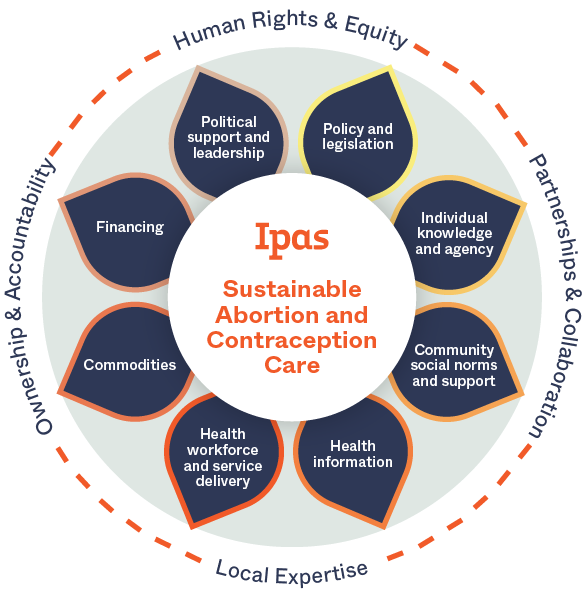Innovation
Ensuring proper access to sexual and reproductive health and rights is not a simple task that can be accomplished merely by doing what is necessary. This sector faces complex challenges, such as a limited health workforce and stigmatized communities, which often hinder both the delivery of services and the willingness of individuals to seek them.
To address unresolved issues and support women who have been left behind, we develop and explore innovative approaches. We create customized service models and design people-centered programs to bring meaningful impact to the community.
Health system strengthening
At Ipas Bangladesh, our focus is on strengthening health systems to ensure the sustainable delivery of high-quality SRH services. We collaborate closely with the government to provide technical support, aiming to maintain consistent supplies of essential commodities and minimize stock-outs that can limit women’s and girls’ healthcare choices. Our initiatives include:
- Supporting public and private health facilities in offering stigma-free and non-judgmental SRH services of the highest quality.
- Supporting the Directorate General of Health Services (DGHS) and Directorate General of Family Planning (DGFP) in strengthening logistics and data management systems to ensure the provision of quality SRH services.
- Providing comprehensive training for healthcare professionals, including doctors, nurses, midwives, and Family Welfare Visitors (FWVs), covering menstrual regulation (MR), postabortion care (PAC), and family planning (FP) provision and counseling.
- Conducting post-training follow-up sessions with healthcare providers to ensure their proficiency and confidence in delivering quality SRH services.
Advocacy
Ipas Bangladesh is dedicated to enhancing sexual and reproductive health and rights (SRHR) in Bangladesh. Our efforts center on advocating for comprehensive reproductive healthcare, empowering women and girls, and ensuring safe and legal access to abortion and contraception. We engage with various stakeholders to devise and implement innovative strategies aimed at improving access to quality healthcare services, raising awareness, and combating the stigma surrounding SRHR
Technical assistance
Ipas Bangladesh collaborates with the Ministry of Health and Family Welfare (MoHFW) to advocate for updated national policies and technical guidelines aimed at ensuring evidence-based and respectful SRH care while safeguarding the rights of women and girls. Our efforts include providing technical assistance for the revision and update of clinical manuals, such as the Woman-Centered MR and PAC Services: Reference Manual, Trainer’s Manual, and Bangla Manual on Woman-Centered MR and PAC Services for mid-level providers. These manuals have been disseminated to healthcare providers by the DGHS and DGFP, and are also accessible on government websites. Additionally, we support initiatives to integrate SRH topics into the professional curricula of nurses, midwives, and obstetricians/gynecologists. Through our advocacy work, we strive to expand access to care, which has resulted in:
- Expansion of provider base by including MR, PAC, and FP services in the job roles of nurses and midwives.
- Adoption of policies to extend the provision of MR from 10 to 12 weeks of the last menstrual period (LMP).
- Moving towards institutionalizing FP programs in DGHS facilities, ensuring sustainable supplies of FP commodities, and implementing standardized health management information system (HMIS).
- Availability of standardized manuals, training materials, and job aids for MR, PAC, and FP services.
Community awareness and social support
Ipas Bangladesh prioritizes community engagement to empower women and young people, equipping them with the knowledge, confidence, and social support needed to make informed reproductive health decisions. Recognizing the importance of men’s involvement in SRH programming, we undertake various initiatives to enhance their understanding and support for women’s and girls’ SRHR. These include:
- Strengthening community mobilization efforts and establishing links between communities and healthcare facilities to encourage uptake of SRH services.
- Providing technical and programmatic support to local partners for organizing community dialogues, local and mass media campaigns, and events. We leverage traditional media, social media, and digital technologies to raise awareness, garner support for SRHR, and challenge misconceptions and stigma.
- Collaborating with the Directorate General of Family Planning (DGFP) and Directorate General of Health Services (DGHS) to develop Social and Behavior Change Communication (SBCC) strategies, messages, and materials.”
Humanitarian Support
Following the ethnic cleansing in Rakhine State in Myanmar, hundreds of thousands of Rohingya community members, known as FDMN, sought refuge in various camps in Cox’s Bazar and Bashan Char, Bangladesh. Many women and girls among them have experienced sexual violence and are in urgent need of SRH care. In partnership with UNFPA and collaboration with the government, Ipas Bangladesh initiated efforts in 2017 to provide quality MR and PAC services in refugee camps in Cox’s Bazar, expanding to include family planning services in 2018. Additionally, Ipas Bangladesh extended support to introduce SRH services, including gender-based violence (GBV) services, for relocated FDMN individuals at Bhasanchar Island in Noakhali district starting in 2021. Furthermore, we conduct SBCC activities in the camps to enhance individual knowledge, motivation, and community support, engaging women, men, and community and religious leaders.
Research and Evidence Generation
Ipas Bangladesh conducts research studies aimed at enhancing the understanding of various aspects related to SRHR in Bangladesh. Our research focuses on assessing the accessibility and availability of SRH services, understanding the causes and consequences of intimate partner violence (IPV) and reproductive coercion (RC), investigating the intersection of climate change vulnerability and SRHR, exploring providers’ biases during client counseling sessions, and examining the impact of crises, such as the COVID-19 pandemic, on access to and utilization of SRH services. Key research initiatives by Ipas Bangladesh include:
- Adaptation and Testing of the ARCHES Intervention to Reduce Reproductive Coercion in Bangladesh.
- Adaptation and Testing of the ARCHES Intervention to Reduce Reproductive Coercion in the Humanitarian Setting in Cox’s Bazar.
- Study on the Impact of Climate Change on Reproductive Health Decision-Making among Women in Bangladesh.
- Abortion Service Quality (ASQ) Indicator Validation Study.

